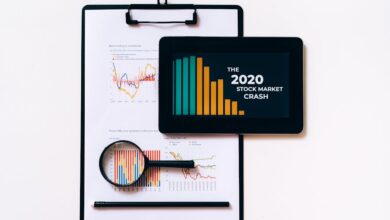Navigating Economic Turbulence: Understanding Recession Signs, Strategies, and Government Responses

In an increasingly interconnected world, the specter of economic recession looms as a significant concern for individuals, businesses, and governments alike. Understanding the early warning signs of a recession is crucial for developing proactive strategies to navigate potential downturns. This article explores the multifaceted impact of recessions across various sectors, examining how economic contractions can affect everything from consumer behavior to global trade and supply chains. We will also delve into effective investment strategies during turbulent times, highlighting how to make informed decisions when markets become volatile. Additionally, the role of government stimulus in mitigating the adverse effects of recessions will be analyzed, along with lessons learned from historical downturns that remain relevant today. By equipping ourselves with knowledge and preparation, we can better position ourselves to weather the storm of economic uncertainty and emerge resilient on the other side.
- 1. Recognizing the Red Flags: Early Warning Signs of an Economic Recession
- 2. Weathering the Storm: Strategies for Investing and Surviving Economic Downturns
- 3. The Government's Safety Net: The Role of Stimulus in Easing Recessionary Pressures
1. Recognizing the Red Flags: Early Warning Signs of an Economic Recession
Recognizing the early warning signs of an economic recession is crucial for businesses, investors, and policymakers alike. Several key indicators can signal an impending downturn, allowing stakeholders to take proactive measures.
One of the most prominent signs is a decline in consumer confidence. When households start to feel uncertain about their financial prospects, they tend to reduce spending, which can lead to decreased demand for goods and services. This shift is often reflected in consumer surveys and spending data, where a noticeable dip can foreshadow broader economic challenges.
Another important indicator is rising unemployment rates. As companies begin to anticipate lower demand, they may start laying off workers or halting hiring. An increase in jobless claims can signal that businesses are tightening their belts, which can further depress consumer spending and contribute to a downward economic spiral.
Additionally, changes in key economic metrics, such as gross domestic product (GDP), can provide valuable insights. A consistent decrease in GDP over two consecutive quarters is often used as a technical definition of a recession. Other metrics, like reduced industrial production, declining retail sales, and shrinking business investment, can also serve as red flags.
Financial markets may also exhibit signs of distress. A significant drop in stock prices or a yield curve inversion—where short-term interest rates exceed long-term rates—can indicate investor pessimism about future economic growth. These events often prompt a reevaluation of economic forecasts and business strategies.
Lastly, increasing levels of debt, whether at the household or corporate level, can heighten vulnerability to economic shocks. High leverage can limit flexibility and increase the risk of defaults, particularly when cash flows diminish during an economic downturn.
By closely monitoring these early warning signs, individuals and organizations can better prepare for the challenges posed by a potential recession, allowing them to make informed decisions and mitigate adverse effects.
2. Weathering the Storm: Strategies for Investing and Surviving Economic Downturns
Investing during an economic downturn requires a strategic approach to mitigate risks and seize opportunities. One key strategy is to focus on defensive stocks, which tend to perform better during recessions. These include sectors such as utilities, consumer staples, and healthcare, as they provide essential goods and services that remain in demand regardless of economic conditions.
Another strategy is to diversify investments across different asset classes, including bonds, real estate, and commodities. This diversification can help reduce overall portfolio volatility and provide a buffer against losses in any single sector. Additionally, considering dividend-paying stocks can offer a source of income even when stock prices are under pressure.
Investors should also maintain a long-term perspective, recognizing that market downturns are typically temporary. By avoiding panic selling and sticking to a well-thought-out investment strategy, individuals can position themselves to benefit from the eventual market recovery.
For businesses, preparing for a recession involves strengthening their financial health. This might include reducing debt, optimizing cash flow, and maintaining a reserve of liquid assets. Businesses should also assess their operational efficiency, looking for areas where costs can be cut without sacrificing quality or customer satisfaction.
Moreover, fostering strong relationships with customers can help maintain loyalty during tough times. This can involve enhancing customer service, offering promotions, or communicating transparently about how the business is navigating the downturn.
Ultimately, whether as an investor or a business owner, the key to weathering an economic storm lies in careful planning, adaptability, and a focus on long-term goals. By implementing these strategies, individuals and businesses can not only survive a recession but also emerge stronger when the economy rebounds.
3. The Government's Safety Net: The Role of Stimulus in Easing Recessionary Pressures
During economic downturns, governments often implement stimulus measures to mitigate the adverse effects of recessions. These measures can take various forms, including direct financial assistance to individuals, tax cuts, and increased public spending on infrastructure and services. The primary goal of stimulus initiatives is to boost consumer demand, stabilize financial markets, and support businesses that may be struggling due to reduced economic activity.
One of the most significant aspects of government stimulus is direct cash transfers, which provide immediate relief to households. This can help maintain consumer spending, which is crucial since consumption typically accounts for a large portion of GDP. By putting money directly into consumers’ hands, governments aim to encourage spending on essential goods and services, thereby stimulating economic activity and preventing deeper recessions.
Additionally, governments may increase spending on infrastructure projects, which not only creates jobs but also enhances long-term economic productivity. Investments in infrastructure can lead to improved transportation, utilities, and communication systems, fostering a more conducive environment for businesses to thrive post-recession.
Central banks also play a vital role during recessions through monetary policy, such as lowering interest rates or implementing quantitative easing. These actions make borrowing cheaper, encouraging both consumer and business spending. The combination of fiscal and monetary stimulus can create a comprehensive safety net that helps cushion the economy against severe downturns.
However, the effectiveness of government stimulus can vary based on factors such as the size of the stimulus, the speed of implementation, and the existing economic conditions. Critics argue that poorly targeted or delayed stimulus measures may lead to inefficiencies or increased national debt without significantly impacting recovery. Therefore, careful planning and execution are essential to ensure that stimulus efforts provide the intended relief and promote sustainable economic recovery.
Overall, government stimulus acts as a crucial safety net during recessions, aiming to stabilize the economy, support vulnerable populations, and lay the groundwork for recovery.
In conclusion, understanding the multifaceted nature of economic recessions is crucial for both individuals and businesses looking to navigate the challenges they present. By recognizing early warning signs, such as declining consumer confidence and rising unemployment, stakeholders can better prepare for potential downturns. The impact of recessions extends beyond immediate financial concerns, affecting various sectors, global trade, and supply chains, highlighting the interconnectedness of the modern economy.
Investors are encouraged to adopt strategic approaches during these turbulent times, focusing on diversification and resilience. Government stimulus plays a vital role in cushioning the blow of economic contractions, providing necessary support to both consumers and businesses alike. Moreover, shifts in consumer behavior during recessions emphasize the importance of adaptability for businesses aiming to survive and thrive.
Learning from past recessions offers valuable insights that remain relevant today, underscoring the need for proactive planning and robust risk management strategies. Ultimately, by fostering an understanding of these dynamics and implementing thoughtful strategies, we can not only weather the storm of economic downturns but also emerge stronger on the other side.





